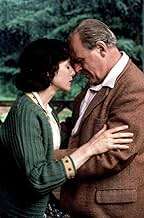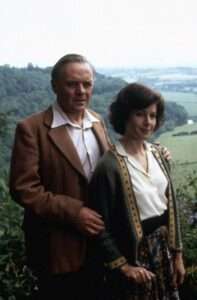Few films explore the depth of human emotion with the same quiet intensity as Shadowlands (1993). Directed by Richard Attenborough and starring Anthony Hopkins and Debra Winger, this deeply moving biographical drama tells the story of renowned British writer C.S. Lewis and his unexpected romance with Joy Gresham. Based on the real-life relationship between the two, Shadowlands is a film that delves into love, grief, and the way life’s most profound lessons often come through suffering. With masterful performances, exquisite cinematography, and a script filled with poetic wisdom, this film is as intellectually stimulating as it is emotionally devastating.
A Story of Intellectualism and Unexpected Love
Set in the 1950s, Shadowlands follows C.S. Lewis (Anthony Hopkins), a highly respected professor at Oxford University, well-known for his works on Christian theology and his famous Chronicles of Narnia series. A bachelor in his fifties, Lewis lives a life of quiet routine, deeply immersed in academia and religious contemplation. He lectures eloquently on pain and suffering, confidently discussing how suffering shapes the soul. However, his theoretical understanding of love and grief is challenged when he meets Joy Gresham (Debra Winger), an outspoken and intelligent American poet who arrives in England with her young son.
At first, their relationship is one of intellectual companionship—Joy’s wit and directness challenge Lewis’s reserved nature, and he finds himself drawn to her in ways he does not initially comprehend. What begins as a friendship gradually blossoms into something deeper. But just as Lewis allows himself to embrace the happiness he had long dismissed as unattainable, tragedy strikes—Joy is diagnosed with terminal cancer. Suddenly, Lewis is forced to confront the very suffering he has spent his life theorizing about, and his journey through grief becomes one of the most poignant aspects of the film.
Anthony Hopkins’ Towering Performance
Anthony Hopkins delivers one of the most nuanced performances of his career in Shadowlands. His portrayal of C.S. Lewis is a masterclass in subtlety, capturing the professor’s intellectual confidence, emotional restraint, and eventual vulnerability with incredible precision. Hopkins’ ability to convey deep emotions with the slightest changes in facial expression makes Lewis’s transformation all the more compelling. Whether in scenes of quiet introspection or moments of heart-wrenching grief, Hopkins ensures that Lewis remains a deeply human figure, not just an academic lost in philosophical musings.
Debra Winger, as Joy Gresham, provides the perfect contrast to Lewis’s reserved demeanor. She is bold, passionate, and full of life—a woman who refuses to be anything but authentic. Her portrayal brings warmth and humor to the film, making Joy’s eventual illness all the more tragic. The chemistry between Hopkins and Winger is deeply affecting, evolving from intellectual camaraderie to profound love in a way that feels entirely natural.

A Story Told Through Subtlety and Atmosphere
Richard Attenborough directs Shadowlands with a delicate and restrained hand. The film’s pacing is slow but deliberate, allowing the audience to fully absorb the emotional weight of each scene. The cinematography, by Roger Pratt, is beautifully composed, with soft lighting and carefully framed shots that enhance the film’s introspective mood. The English countryside and the grandeur of Oxford’s academic halls provide a picturesque backdrop to the unfolding drama, reflecting both the beauty and the isolation of Lewis’s inner world.
The screenplay, written by William Nicholson, is another triumph. Adapted from his own stage play, Nicholson’s script is filled with lyrical dialogue that never feels forced. The film explores complex themes—faith, love, and the purpose of suffering—without becoming overly didactic. The conversations between Lewis and his colleagues, as well as his deeply personal exchanges with Joy, are rich with philosophical depth yet remain grounded in genuine emotion.
Themes of Faith, Suffering, and the Cost of Love
At its heart, Shadowlands is a meditation on the paradoxes of love and pain. Lewis begins the film with a comfortable, detached view of suffering, believing it to be a necessary part of human growth. However, when he experiences the agony of losing Joy, his faith is shaken. He questions God, struggles with the meaning of pain, and ultimately comes to understand that love and suffering are inextricably linked.

One of the film’s most poignant moments comes when Lewis, after Joy’s death, confesses, “The pain now is part of the happiness then. That’s the deal.” This line encapsulates the film’s central message—that deep love comes with the risk of deep loss, but that does not make love any less valuable. It is a realization that is profoundly moving, resonating with anyone who has ever faced loss.
A Heart-Wrenching Yet Hopeful Conclusion
The film does not offer easy answers or neatly tied conclusions. Instead, it leaves the audience with a sense of quiet reflection. Lewis’s journey does not end with despair but with a deeper, albeit painful, understanding of life’s fragility and beauty. He is forever changed by Joy—not only through his grief but through the love she brought into his life.
Shadowlands does not rely on melodrama to evoke emotion. Its power lies in its restraint, its quiet moments of realization, and the raw honesty of its performances. The final scenes, in which Lewis walks through the rain with Joy’s son, are simple yet profoundly touching, symbolizing the continuation of life even in the face of devastating loss.
Legacy and Impact
Though Shadowlands was not a massive box office success upon release, it has since gained recognition as one of the most poignant and intelligent romantic dramas of its time. Anthony Hopkins received widespread acclaim for his performance, earning a BAFTA Award, while Debra Winger’s portrayal of Joy was equally lauded. The film’s quiet brilliance and emotional depth have ensured its place as a deeply respected piece of cinema.
Moreover, the film offers a rare and honest depiction of grief—one that does not shy away from its complexity. It resonates not only as a love story but as a meditation on human fragility, making it a film that continues to be relevant and deeply moving decades after its release.

Final Verdict: A Masterpiece of Emotion and Intellect
Shadowlands is not just a film about C.S. Lewis—it is a film about all of us. It speaks to the universal experience of love and loss, of joy and sorrow intertwined. With its powerful performances, stunning cinematography, and deeply moving script, it is a cinematic masterpiece that lingers in the mind and heart long after the credits roll.
For anyone who has ever loved and lost, Shadowlands is an essential viewing experience. It is a film that reminds us of life’s fleeting beauty and the profound impact that love—however brief—can leave on our souls.
Rating: 9.5/10





